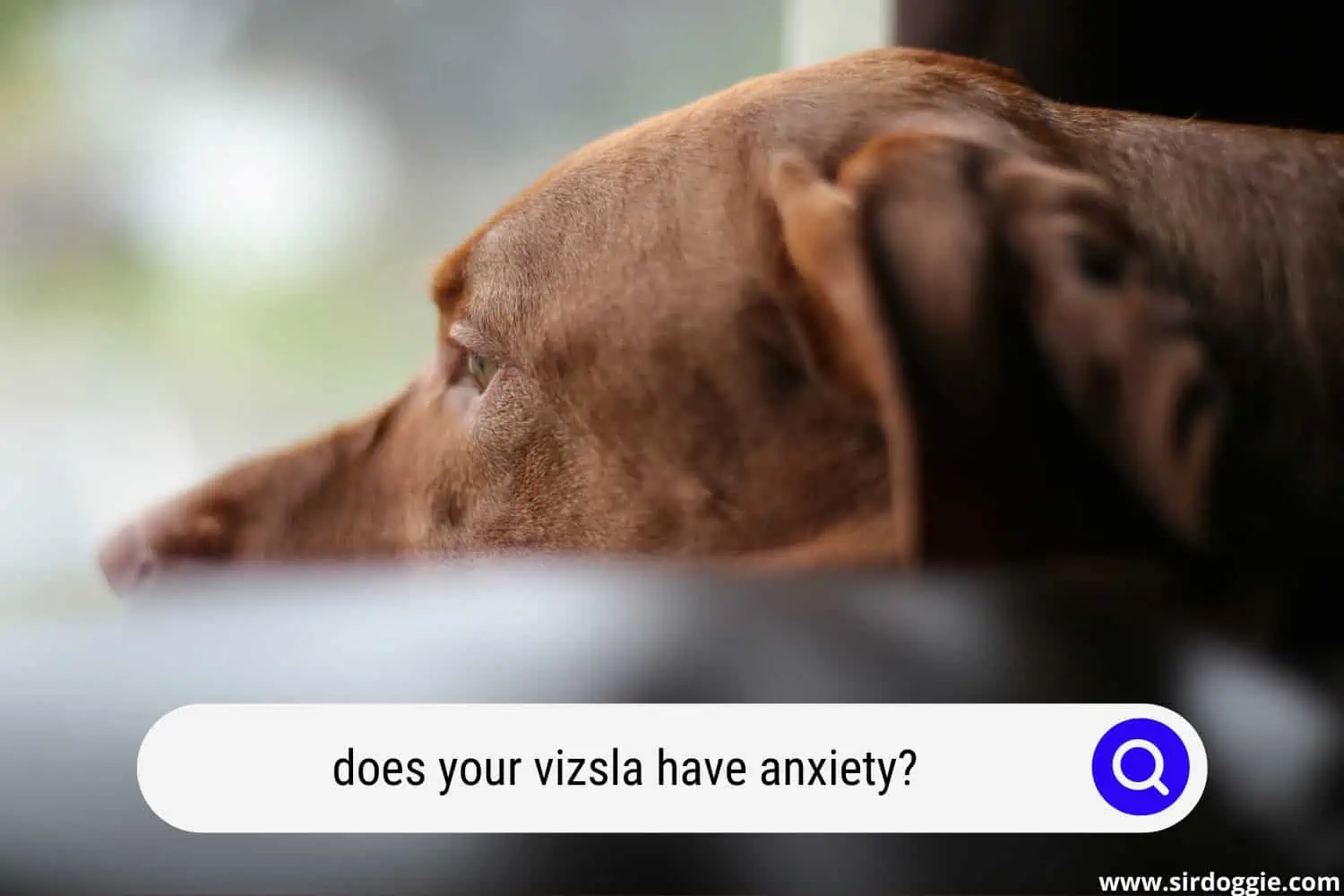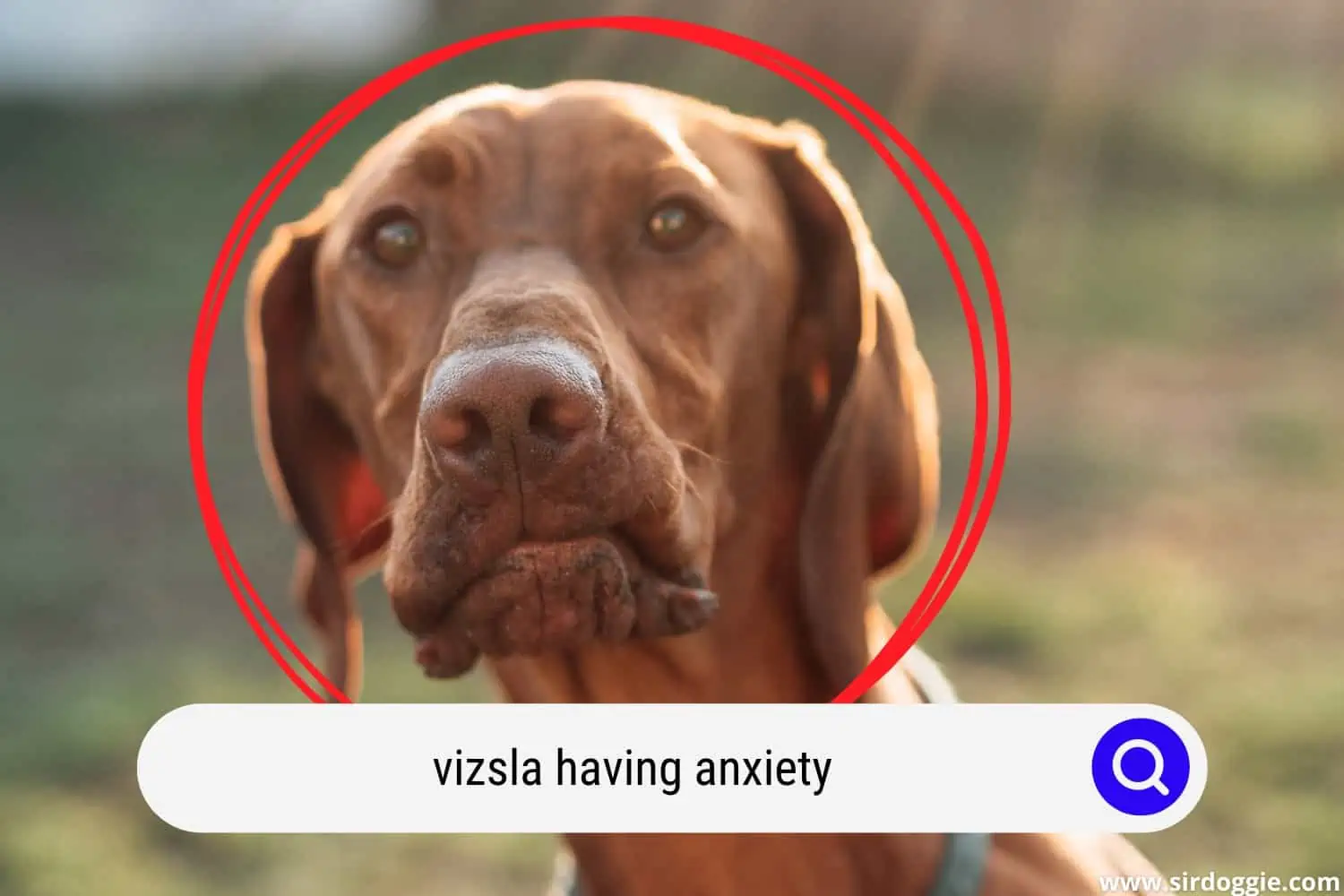Does Your Vizsla Have Anxiety?
Vizslas have a characteristic that is very common in many dogs. It is about separation anxiety. All dogs of this breed suffer from anxiety for various reasons, and many are due to different issues.

Pets have a hard time showing how they feel, and owners sometimes don’t notice the little signs and details of emotional distress that their canines show. Anxiety in a Vizsla can lead to serious behavior problems, so you should do everything you can to treat and help it with its condition.
Why Does My Vizsla Dog Suffer From Anxiety?
There are many reasons why Vizsla dogs suffer from anxiety, but the most common reasons are separation, aging, or fear.
1. Separation Anxiety
It is the most common reason why Vizsla canines suffer from anxiety. When dogs of this breed are left alone or separated from their human families, they can become uncomfortable and act based on strange and erroneous behaviors, such as urinating and defecating inside your home. Also, they could destroy furniture and bark excessively.
In theory, it is not a good idea to leave Vizslas alone for long, as they will begin to worry and consequently feel distressed and anxious.
2. Aging Anxiety
When Vizsla dogs reach adulthood and begin to age over time, it causes anxiety. As this type of dog ages, even more, they will develop a syndrome well known as cognitive dysfunction syndrome (CDS), which affects and disturbs their senses, perception, memory, and learning.
Vizslas have always had a very good memory, but dogs of this breed that have cognitive dysfunction syndrome will gradually lose the ability to memorize and remember many things. Besides, the dog’s consciousness begins to decline, causing discomfort, anguish, and, of course, anxiety.
3. Fear Anxiety
The fear and panic of Vizsla dogs can be due to situations as simple as:
- Changes in the environment (a season of the year or moving to another house or city).
- Visual stimuli, such as a large umbrella or hat.
- Situations such as going to the vet or even the feeling of grass under their paws.
- Loud noises.
- New and strange people or animals.
Any of these factors can trigger fear and dread in Vizslas, especially if they are experiencing any of these situations for the first time.
How Do I Know That My Vizsla Dog Is Suffering from Anxiety?
Usually, we can detect when our Vizsla is feeling anxiety through various symptoms.
Next, we will tell you some of the signs that you should find in your Vizsla dog in case it suffers from anxiety. One of the most common symptoms that your pet can have is its compulsive and destructive behavior and its aggressive personality.
Also, these dogs can trigger unhygienic habits such as urinating and defecating anywhere and drooling everywhere.
Your Vizsla could bark frequently and excessively for no reason. Another symptom that your canine may present is a hyperactive attitude; that is, it will be restless at all times, and in many cases, it will become depressed.
It is worth mentioning that Vizslas’ aggression is considered the most distressing and complicated symptom that an anxious dog can show. That is because the pet’s direct or indirect attack can be dangerous for the owners and the other animals. That is taking into account that this breed of dog generally does not present aggressive behaviors.
If your dog urinates and defecates indoors despite being well-trained, it may be a clear sign that it suffers from anxiety. It is considered one of the most common symptoms in dogs with stress.
This symptom can also be dangerous since there are many dogs that suffer from greater anxiety and tend to leave or escape from their cages or houses without any care, which causes certain accidents and serious injuries to your pet.
How Can I Treat My Vizsla Dog’s Anxiety?
First of all, you have to consult a veterinarian, even better if your Vizsla dog’s veterinarian. The medical professional can help you identify what type of anxiety your pet has and help control it.
Veterinarians can also find out if your Vizsla has other medical conditions and apply the best treatment.
Once the veterinarian finds out what type of anxiety it is, he or she can help you plan treatment for your dog. Because there are various factors that cause stress in dogs, the best treatment is usually through a series of training, preventive actions and strategies, and in some cases, medication.
How Can I Prevent My Vizsla Dog from Suffering from Anxiety?
1. Exercise
Keeping your Vizsla dog healthy can help you prevent any behavioral problems that it is capable of presenting. You can quickly rule out the places that may cause some kind of irritation, stress, or anxiety to your pet.
Vizsla dogs love walks and are happy when they go out to run and play with their owners or with their other dog friends, so it is a great idea to always take them out for a walk.
2. Body Language
Learn to read and understand your Vizsla’s body language and get an idea of when it feels uncomfortable or stressed.
Body language can also show that a Vizsla dog has anxiety or aggression. Avoid this by understanding the small details of your canine’s body language.
Socialization with Other People and Animals
Introducing your dog to new people, animals, and situations can prevent your Vizsla from feeling anxiety when it goes out for a walk or goes to the vet.

3. Avoid Delicate Situations
For dogs with anxiety, you have to avoid situations that trigger stress in your Vizsla. If those circumstances are unavoidable, then you can take preventive measures so that your pet can have less stress when experiencing this situation. Some pets do not like to be with other people than their own owners since it generates insecurity and anxiety.
Even though Vizsla dogs are very friendly and loving canines with all people, they are very affectionate when it comes to their owners, so when their humans leave the house for long hours, they tend to become distressed and therefore feel anxious.

Family Dog Expert Author
Hi there! I’m Stuart, a devoted dog lover and family dog expert with over a decade of experience working with our furry companions. My passion for dogs drives me to share my knowledge and expertise, helping families build strong, loving bonds with their four-legged friends. When I’m not writing for SirDoggie, you’ll find me hiking, playing with my beautiful dog, or studying music.